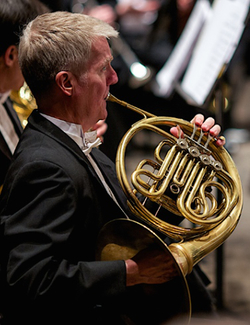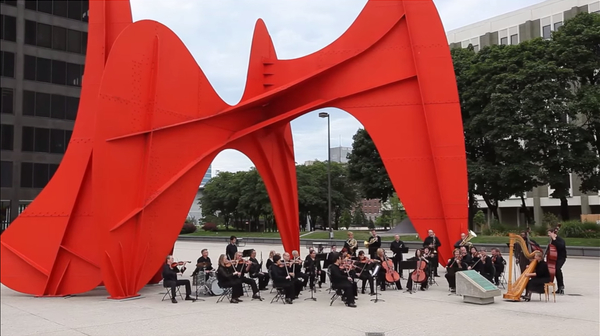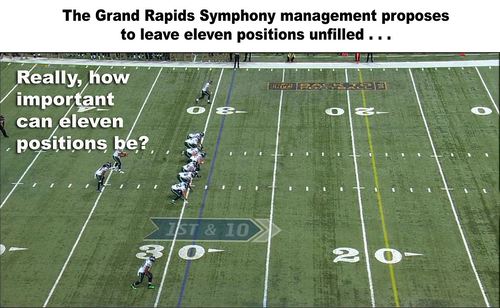
Photo credit: Terry Johnston
The contract negotiations in Grand Rapids that culminated in a tentative agreement in mid-March and a ratified contract in April were like a thousand-piece jigsaw: the solution, which seemed impossible even after a great deal of struggle, suddenly and miraculously fell into place after incremental and seemingly insignificant progress.
This negotiation made history for us. The story of this five-year contract, perhaps the longest in the history of the organization, reached after twelve months of hard bargaining and taking the organization to its 90th anniversary season (2019-20), well, that will be a story to share in Grand Rapids for years to come.
In any negotiation, there are always unexpected twists and turns, and actions that have surprising and unexpected results. For example, back in 2011, the video that the musicians created about the value we bring to our community was viewed by board members and perhaps led to that successful settlement. (Note: See the video here)

Still from Grand Rapids Symphony Musicians Association video
Photo credit: Courtesy of the Grand Rapids Symphony Musicians Association
Looking back to the events that unfolded this time, the positive outcome of these negotiations in Grand Rapids could be attributed to the many ways in which the musicians used social media.
In August 2015, GRS Assistant Principal Bass Michael Hovnanian led the development of the musicians’ e-newsletter, which got our stories published and our messages to the public. (Note: see the newsletter here)
For two months we published musician profiles and important articles related to our negotiations. We also encouraged our supporters to write Letters to the Editor and submit them to local media. But we became aware that none of these letters were being published, either in the print editions or online. As a result, we adjusted our plan: we first contacted those who had already written letters, and with their permission we posted these in our GRSMA e-newsletter and on our website—there were several issues of the newsletter devoted entirely to these letters. Then, going forward, we asked writers to email their letters directly to the GRS Board Chair and Secretary as well, and all granted permission for us to publish their letters ourselves. We eventually stopped asking writers to submit the letters to local media at all, as our own publishing efforts had proved so successful.
The letters showed a level of support of which the GRS Board had been unaware, both on a local and international level. Unfortunately, it seemed that the letters did not have the intended impact; the proposals in the fall of 2015 remained unchanged in terms of financial cutbacks.
We needed to focus upon issues that were most important to our membership, and it was decided to do so through social media. On Thanksgiving of 2015 we launched our Facebook campaign, created by GRS Assistant Principal/Second Oboe Alexander Miller, which addressed management’s desire to allow eleven positions to be open in the orchestra. For several weeks, many creative graphics were posted, shared, liked, and commented upon on Facebook at a level that both surprised and inspired the negotiation team. (Note: view a photo gallery of the campaign here)

A post from the GRSMA Facebook campaign
Photo credit: Courtesy of the Grand Rapids Symphony Musicians Association
When movement regarding the issue of open positions finally occurred at the bargaining table, we decided to launch a second campaign on March 1st that addressed the retirement contribution that had been suspended since 2009. (Note: view these graphics here)
Anyone interacting on Facebook took notice of the comments from our public about the importance of the musicians’ retirement account. Everyone involved in the negotiations realized how critical this issue was for a successful contract, and movement in this area occurred soon.
The open positions and the musicians’ retirement accounts are just two of the elements of our new agreement. But those were the two issues that we decided to highlight on social media in a methodical and informative way, as they had particular significance for our negotiating committee.
A few weeks after contract ratification, the Grand Rapids Symphony announced that it reached its goal of $40 million for its endowment campaign. Launched in 2012 as the Legacy of Excellence, with $20 million from local philanthropists Richard and Helen DeVos, an additional $20 million has been raised since then. The musicians are pleased by the generosity of our community, and the success of this endowment campaign firmly solidifies our organization for years to come.
It would be wrong to not name my colleagues who served on the committee. Co-chair Diane McElfish Helle was tireless in her work. While we share an alma mater (University of Cincinnati College-Conservatory of Music) as well as a birthday (May 25th), our work hours vastly differed; as if on a tag team, Diane would work until 4am and then I would pick up where she left off at 5am for our duties as co-chair. The other committee members, Beth Colpean, Barb Corbato, Jeremy Crosmer, Chris Martin, and Leslie Van Becker, devoted hundreds of hours in preparation, not to mention critical note taking at the table. Outside of our committee work, this team endured huge life events (including major illnesses, marriage, and loss of parents), and we became very close. I challenge anyone to find a more dedicated group of colleagues.
The list of people that we wish to thank seems to be endless, as so many stood beside us in a variety of ways. Randy Whatley, President of Cypress Media, gave us sage advice for our public relations platform. AFM Local 56 leadership Eric Vander Stel and Gary Sironen believed that, rather than using a more traditional approach, it would be more cost effective to hire Randy and have a smart campaign in order to reach a fair contract. Without the guidance of SSD Negotiator Nathan Kahn, this process would not have been a success. To all who wrote letters of support, bought GRSMA T-shirts, put our yard signs in their front lawns, attended our events, and especially to those who interacted with us on social media, we send a sincere and heartfelt thanks.
In the end, who can really say which puzzle piece completed the picture? But it would be an accurate and fair assessment to say that social media played a positive role for the 2015-16 negotiations in Grand Rapids.
(Additional Note: As of this writing, the Grand Rapids Symphony is poised to announce the selection of its new Music Director. This piece of news is yet another reason that the GRS is at a turning point for the organization’s future.)





